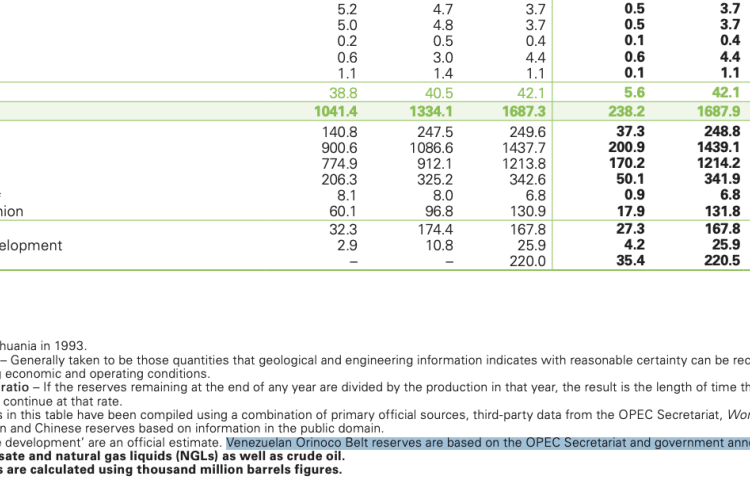The claim that Venezuela had the "world's largest oil reserves" went viral during Hugo Chavez's presidency. It is a very convenient claim, from a geopolitical and economic viewpoint. It somehow makes the country more relevant. Chavez nurtured and repeated the legend every time he could. It became one of those revolutionary mantras that everyone regurgitates without question, like the lie that Venezuela was declared an "illiteracy free territory" by UNESCO.
A prospectus filed by PDVSA with the SEC provides interesting comments about it:
"Venezuelan proved crude oil and gas reserve estimates involve some degree of uncertainty and may prove to be incorrect over time, which could adversely affect our ability to generate income.
The proved crude oil and gas reserves set forth in this offering circular are our estimated quantities of crude oil, natural gas and natural gas liquids that geological and engineering data demonstrate with reasonable certainty to be recoverable from known reservoirs under existing economic and operating conditions (i.e., prices and costs as of the date the estimate is made). All reserves of oil and natural gas located within Venezuelan territory belong to the Bolivarian Republic of Venezuela and the amounts thereof are estimated by PDVSA and approved by the Ministry of Petroleum. The standards applied by the Ministry of Petroleum are recognized and used worldwide, making the declared results comparable to the ones of other countries. The oil located in the Orinoco Oil Belt has been certified by Ryder Scott Co. LP. Our proved oil and gas reserves have not been verified by any independent third party. Venezuelan proved developed crude oil and gas reserves are reserves that can be expected to be recovered through existing wells with existing equipment and operating methods. In the past, we revised our expected recovery factor for the Orinoco Oil Belt from 8% to 20%, based on existing economic and operating conditions, as well as on the availability of improved recovery technologies and broader information regarding reservoir performance parameters such as cumulative production, production rate, reservoir pressure and gas oil ratio behavior. The foregoing led the addition of 131,421 million barrels to our previously existing internally certified proved reserves over the past five years.
There are uncertainties in estimating quantities of proved reserves related to prevailing crude oil and natural gas prices applicable to our production, which may lead us to make revisions to our reserve estimates. Moreover, many of the factors, assumptions and variables involved in estimating proved reserves are beyond our control and are subject to change over time. Consequently, measures of reserves are not precise and are subject to revision. Downward revisions in our reserve estimates could lead to lower future production, which could affect our results of operations and financial condition." [bold added]
Republishing these unverified figures in BP's Statistical Review in the past added to the myth. A caveat in BP's report was, and continues to be, missed in all reporting related to the topic: "Venezuelan Orinoco Belt reserves are based on the OPEC Secretariat and government announcements." [bold added]
Who gives figures to the OPEC Secretariat? Yup, the chavista regime.
No serious business, media, government, multilateral organization or NGO takes announcements from the Venezuelan government at face value. It is an established fact that chavismo is anything but credible. Every single metric related to Venezuela and its economy has been changed, and/or misreported, and/or ignored in order to fit the chavista narrative. In fact, different Venezuelan governments in the past used to publish indicators and official figures related to its economy, PDVSA, etc., but that has not been the case for many years.
The claim that Venezuela has the world's largest oil reserves belongs in the category of "Cuba has the world's best healthcare system", or Lula's "Venezuela has an abundance of democracy".
Venezuela does have plenty of untapped oil. Current conditions in that country, however, could not be further than those when Chavez first came up with it. Ask Chevron, which recently had to revise own figures pertaining export of production in JVs with PDVSA. The state of dereliction of Venezuela's oil industry is of such magnitude that even an 8% recovery factor of Orinoco Oil Belt crude is insanely optimistic.

